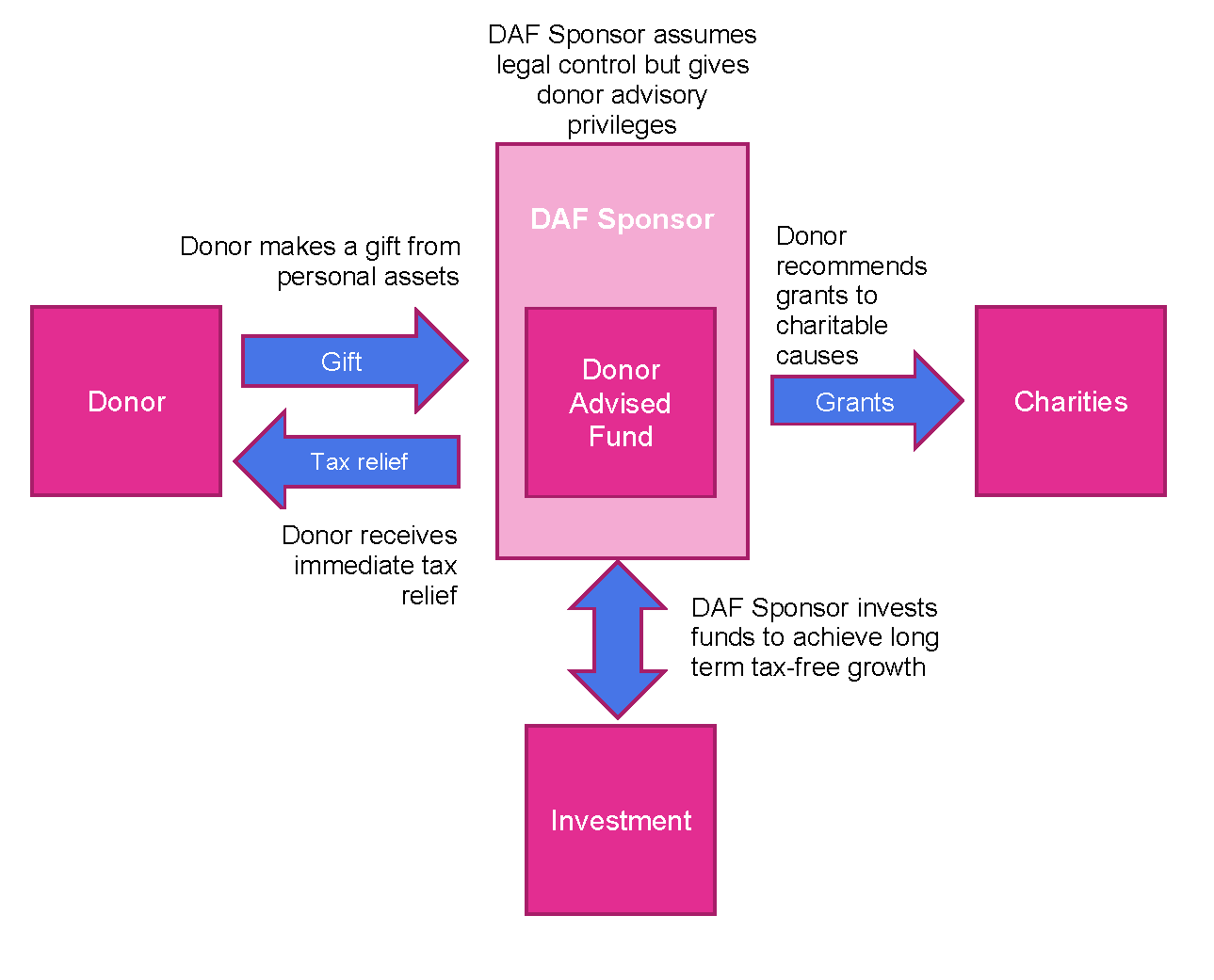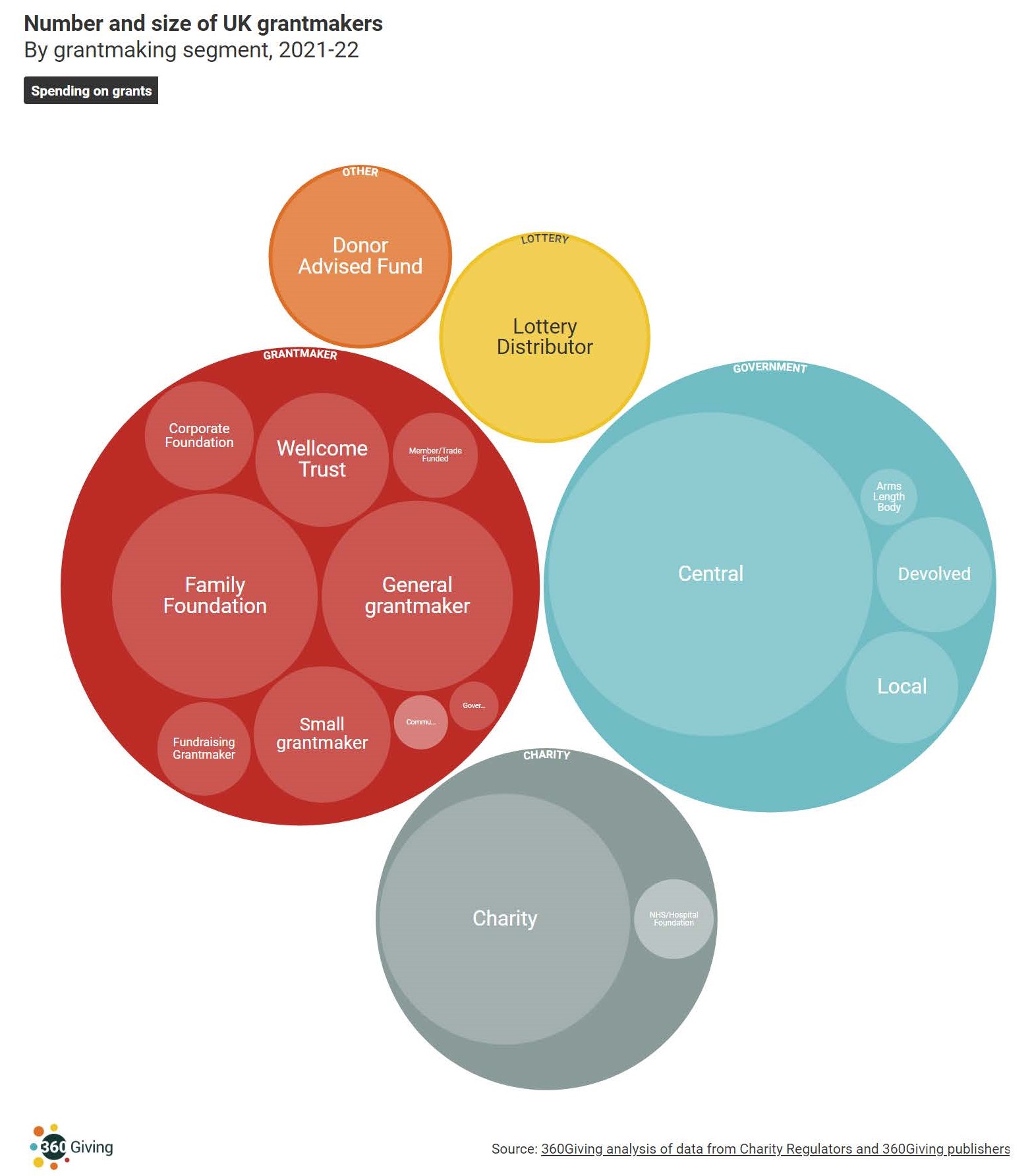Philanthropists are increasingly choosing Donor Advised Funds as a vehicle for their charitable giving. Whereas charitable trusts were once the default option for philanthropists, this is no longer the case. In this article, we explore the growth of Donor Advised Funds and how they compare to charitable trusts.
The growth of Donor Advised Funds
In the past, philanthropists typically pursued substantial long-term charitable giving through a charitable trust. Creating a charitable trust and registering it with the Charity Commission allowed philanthropists to gift capital from their accumulated wealth, and then use the trust to sustain charitable grant-making over many years. This system worked well enough, although the administration associated with setting up and maintaining a charitable trust was often a burden, especially for trusts of a more modest size.
Donor Advised Funds now offer an alternative for UK philanthropists. Administered by a DAF Sponsor, a Donor Advised Fund is a giving vehicle that enables philanthropists to engage in long-term charitable giving. The diagram below illustrates how a Donor Advised Fund works.
 Over the past 30 years, Donor Advised Funds have become incredibly popular in the United States, where they are now more widely used than private foundations. UK philanthropists are increasingly recognising their benefits too. Analysis from 360 Giving shows the growing influence of DAF Sponsors among UK grantmakers. In 2020-21, DAF Sponsors made £1.5bn in charitable grants. That’s almost three times the amount of money granted by corporate foundations and almost as much as the value of grants made from the proceeds of the National Lottery.
Over the past 30 years, Donor Advised Funds have become incredibly popular in the United States, where they are now more widely used than private foundations. UK philanthropists are increasingly recognising their benefits too. Analysis from 360 Giving shows the growing influence of DAF Sponsors among UK grantmakers. In 2020-21, DAF Sponsors made £1.5bn in charitable grants. That’s almost three times the amount of money granted by corporate foundations and almost as much as the value of grants made from the proceeds of the National Lottery.

Given the growth of Donor Advised Funds in the UK and the plentiful supply of DAF Sponsors such as The Charity Service, philanthropists now have a genuine choice when gifting capital from wealth. This begs the question of how charitable trusts and Donor Advised funds compare, and in what circumstances are Donor Advised Funds more attractive?
What are the similarities and differences between grant-making charitable trusts and Donor Advised Funds?
Set-up: A grant-making charitable trust is complex because it involves establishing a new charitable organisation for which the founders must create a governing document and appoint trustees. The founders also need to register the organisation with the Charity Commission, and the application process can take several months. In contrast, a Donor Advised Fund can be set up quickly and easily with a DAF Sponsor who will administer the fund on the donor’s behalf. The DAF Sponsor is already registered with the Charity Commission, and the Donor Advised Fund can usually be opened in a few days. Whilst some DAF Sponsors charge a set-up fee, plenty do not
Tax benefits: Donor Advised Funds offer the same tax benefits as grant-making charitable trusts. When donors gift money to a grant-making charitable trust, they can claim the appropriate tax deductions and reliefs, and the same is true for contributions to a Donor Advised Fund. Donations of property or shares are usually eligible for income and capital gains tax relief with gifts to both charitable trusts and Donor Advised Funds. The advantage of Donor Advised Funds is that DAF Sponsors are already registered to claim Gift Aid from HMRC, whereas a new charitable trust will need to register with HMRC, which may take time.
Donor control: With a grant-making charitable trust, the appointed trustees have control over the organisation and its funds. This means that a donor, through their role as a trustee, can exert control over the investment of the funds and the distribution of grants. However, this also means that a donor, in their role as trustee, is responsible for managing the trust, including meeting all the legal and regulatory requirements. With a Donor Advised Fund, the funds are the legal responsibility of the trustees of the DAF Sponsor. As such, the DAF Sponsor takes responsibility for managing the funds and meeting legal and regulatory requirements. As long as a donor requests grants to qualifying charitable organisations, DAF Sponsors will usually process them, although they do retain the discretion to reject donors’ requests.
Cost: Setting up and maintaining a charitable trust can be much more expensive than a Donor Advised Fund. Founders of charitable trusts may need to pay legal fees and other expenses associated with creating the trust. The trust must also pay for ongoing administrative expenses, including legal, accountancy and independent examination or audit fees. Costs are typically lower with a Donor Advised Fund because the DAF Sponsor can share administration costs across all its funds. DAF Sponsors usually charge between 0.2% and 1% annually for fund administration.
Anonymity: Donor Advised Funds offer philanthropists the option of keeping their charitable giving private. This is because philanthropists can choose to remain anonymous when they make grants through a Donor Advised Fund. This is attractive to philanthropists wishing to avoid attention and unwanted solicitations from charities. Achieving the same level of anonymity through a charitable trust is not so easy because the names of trustees are published on the Charity Commission’s public register of charities.
Philanthropy advice: A significant benefit of Donor Advised Funds is the availability of expert advice and support from the DAF Sponsor. As grantmaking specialists, DAF Sponsors can help philanthropists navigate the charitable sector. Some DAF Sponsors, such as The Charity Service, offer bespoke philanthropy advice services to help donors develop a philanthropy strategy and select high-performing charities to support. If donors set up a charitable trust, they may need to seek their own specialist advice.
When to use a Donor Advised Fund?
A Donor Advised Fund will tend to be more attractive when:
- a philanthropist wants to make a significant charitable gift quickly, for example, when they have realised a large capital gain and would like to claim tax relief in the same tax year;
- a philanthropist wishes to engage in long-term charitable giving without the administrative cost and hassle of setting up a charitable trust;
- a philanthropist wishes to remain anonymous; and,
- a philanthropist wants easy access to expert advice on grant-making strategy and selecting charities to support.
Ultimately, deciding whether to set up a Donor Advised Fund or a charitable trust is personal, and philanthropists should carefully consider their own circumstances and preferences. When weighing up the options, it is always advisable to get professional advice.
If you are interested in setting up a Donor Advised Fund, please book an appointment with an adviser at The Charity Service or get in touch using our Contact Us page.

